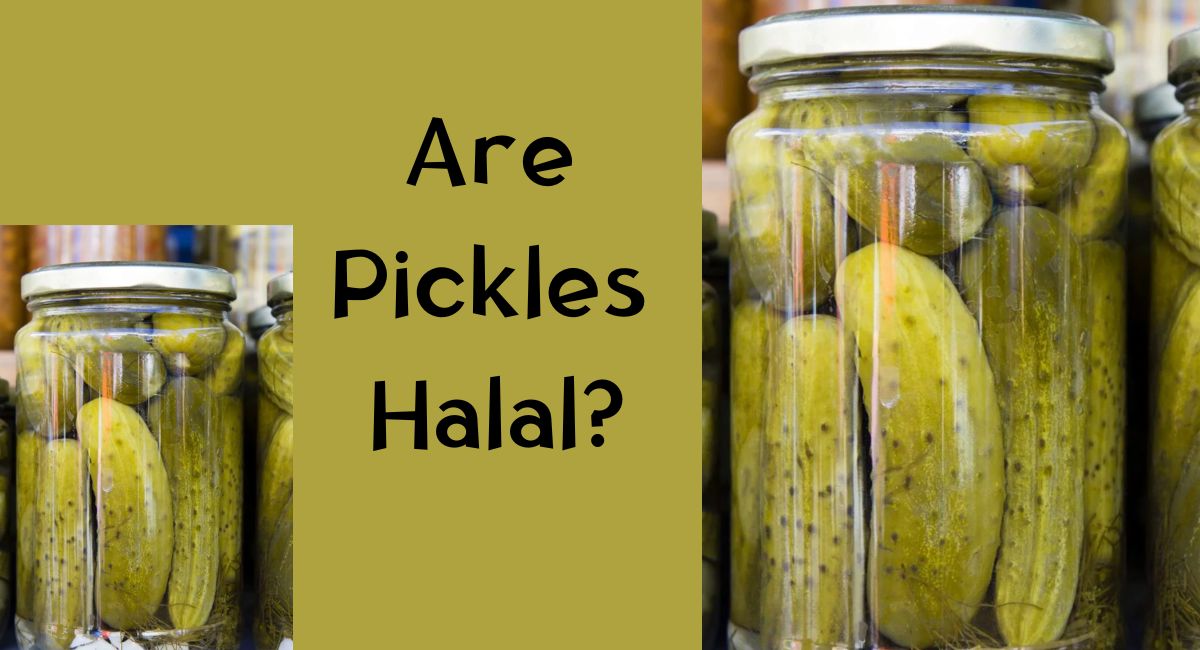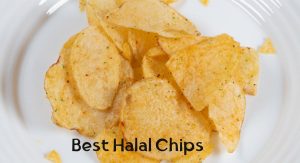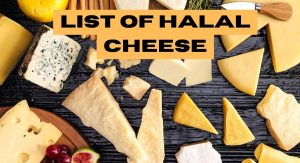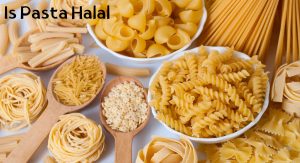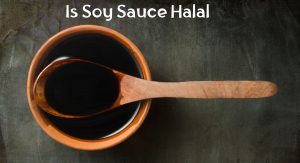The debate over whether or not pickles are considered halal has been an ongoing conversation in the Muslim community for many years. Halal, which means “permissible” or “legal” under Islamic law, is a term used to describe food and other items that are acceptable for Muslims to consume according to their religious beliefs.
Pickles are a widely enjoyed food around the world and are found in many different cuisines, but the question remains: Are pickles halal? In this blog post, we will take an in-depth look at the debate surrounding pickles and their religious implications to help you make an informed decision about whether or not they are suitable for your diet.
We will discuss various interpretations of the Islamic faith, as well as some considerations to keep in mind when consuming pickles. By the end, you should have a better understanding of whether or not pickles are halal for Muslims to enjoy.
Are Pickles Halal
Yes, most varieties of pickles are halal as long as they do not contain any pork or alcohol-based ingredients.
When it comes to pickles, the key factor in determining if they are halal or not is the ingredients used. The most common type of pickle is cucumber-based pickles, and these usually contain vinegar, sugar, salt, spices, and sometimes other herbs.
For a cucumber-based pickle to be considered halal, the vinegar used should not be distilled from an alcoholic source. Similarly, the spices and herbs should also not contain any pork ingredients or alcohol-based ingredients.
In addition to cucumber-based pickles, there are other types of pickles that may be made with fruits or vegetables such as zucchini, tomatoes, peppers, apples, and more. As with cucumber-based pickles, these varieties should also not contain any pork or alcohol-based ingredients in order to be considered halal.
However, some scholars have raised questions about the usage of yeast for fermentation. According to Islamqa:
If the amount of yeast used in pickles or similar foods is very little and does not have the effect of causing intoxication or tiredness, it is permissible to use yeast in them and consume these pickles. However, if the yeast has a lasting effect that can lead to intoxication or tiredness if consumed in large quantities, it is not permissible to use yeast in them or consume such foods.
Ultimately, when it comes to the consumption of food that is considered halal, everyone should follow the guidelines established by their own religious law or cultural tradition for the best results.
When buying pickles, it is important to read the ingredients list carefully and ensure that none of the ingredients are haram. This is the best way to ensure that your pickle consumption is halal-compliant.
Why Are Pickle Halal
Pickles are a popular snack around the world, and many people find them delicious. But for those who follow Islamic practices, it can be difficult to determine if it is Halal or not. According to Islamic law, all food that comes from permissible sources must adhere to certain criteria in order to be considered Halal. So what makes pickles Halal?
- The first factor is the ingredients used in making pickles. Generally, Muslims are allowed to consume products that contain vinegar and salt, as long as they are derived from permissible sources. If any other ingredients are added to the pickles, such as spices or sweeteners, then those must also be certified Halal before being considered acceptable for consumption.
- The second factor is the process of pickling itself. Halal pickles are usually made with an acid-fermented brine, where natural bacteria convert the sugar and salt into lactic acid, preserving and flavouring the food. This fermentation process does not involve any animal products or byproducts, making it compliant with Islamic dietary regulations.
- Finally, the third factor is the packaging and storage of pickles. Halal pickles must be stored in a clean, dry place away from any potential contamination sources such as other animal products or unclean surfaces. Additionally, they should be packaged separately from non-Halal items to prevent cross-contamination.
Ultimately, as long as pickles are made with permissible ingredients and follow the necessary procedures for Halal production, they can be considered safe and tasty snack for those who adhere to Islamic dietary laws. They can be enjoyed as part of a balanced diet, contributing important nutrients such as vitamins and minerals.
List of Halal Pickles
Pickles are generally considered halal, and there are numerous halal-certified brands available in the market. Listed below are some of them. It is always recommended to check the packaging or contact the manufacturer directly for the most up-to-date and accurate information regarding Halal certification. (Source)
| Brand | Product Name | Status |
|---|---|---|
| Winco Foods | WHOLE SWEET PICKLES | Halal |
| Wickles | PICKLES | Halal |
| Wegmans | FRESH PACK PICKLES | Halal |
| Sysco Reliance | ASSORTED PICKLES | Halal |
| Southern Supreme | BREAD & BUTTER PICKLES | Halal |
| Southern Supreme | MIXED PICKLES-SWEET HOT | Halal |
| ShurSaving | PICKLES | Halal |
| Schorr’s | SOUR PICKLES | Halal |
| Schnucks | PICKLES | Halal |
| Safeway | PICKLES | Halal |
| Sadaf | DILL PICKLES | Halal |
| Rosoff | SOUR PICKLES | Halal |
| Roseli | PICKLES | Halal |
| Rico’s | BREAD & BUTTER PICKLES | Halal |
| Red & White | PICKLES | Halal |
| Pocahontas | MIXED PICKLES-SWEET HOT | Halal |
| Pocahontas | BREAD & BUTTER PICKLES | Halal |
| Nugget Red | PICKLES | Halal |
| Nugget Premium | MIXED PICKLES-SWEET HOT | Halal |
| Nugget Classic | BREAD & BUTTER PICKLES | Halal |
| Nugget Classic | MIXED PICKLES-SWEET HOT | Halal |
| Nugget Black | PICKLES | Halal |
| Nifda | PICKLES | Halal |
| Nature’s Place | PICKLES | Halal |
| Mount Stirling | MIXED PICKLES-SWEET HOT | Halal |
| Member’s Mark | ASSORTED PICKLES | Halal |
| Meijer | PICKLES | Halal |
| Market Basket | FRESH PACK PICKLES | Halal |
| Lowes | PICKLES | Halal |
| Laura Lynn | PICKLES | Halal |
| Kurtz | WHOLE SWEET PICKLES | Halal |
| Konex Foods | DILL PICKLES | Halal |
| IGA | PICKLES | Halal |
| Hy-Top | PICKLES | Halal |
| Great Gherkins | WHOLE SWEET PICKLES | Halal |
| Gradina | DILL PICKLES | Halal |
| Frosty Acres | BREAD & BUTTER PICKLES | Halal |
| Foodhold | FRESH PACK PICKLES | Halal |
| Fiesta Mart | PICKLES | Halal |
| Code Regal | ASSORTED PICKLES | Halal |
| Chef’s Choice | MIXED PICKLES-SWEET HOT | Halal |
| Ben E. Keith | ASSORTED PICKLES | Halal |
| Bell View | FRESH PACK PICKLES | Halal |
| Always Save | WHOLE SWEET PICKLES | Halal |
| Admiration | MIXED PICKLES-SWEET HOT | Halal |
What Are Pickles
Pickles, also known as cucumbers preserved in vinegar or brine, are a popular and versatile ingredient all over the world. Pickling, which is essentially preserving food in an acidic solution such as vinegar and salt, dates back thousands of years. It originated in India and was then spread to other cultures through trade routes.
Pickles are usually made with cucumbers, but other vegetables like carrots, cauliflower and even fruits such as apples can be pickled The process involves submerging the raw foods in a solution of vinegar or brine and adding spices, herbs and other flavourings. The result is a sour, salty and sometimes spicy taste that many people enjoy.
Pickles are an excellent source of dietary fibre and contain health-promoting compounds such as polyphenols and antioxidants. They can also be a nutritious addition to the diet, contributing vitamins A and C, magnesium, calcium, iron and potassium. Pickles provide a crunchy texture that complements salads or sandwiches, making them a popular ingredient in many meals.
Pickles can also be used to make, salsa, and even desserts ice cream or chocolate cake! Pickle juice is a popular drink and has been touted for its health benefits such as helping with hydration and aiding digestion. Pickling is an easy way to preserve food for later use, making it a great choice for canning and storing food.
For those looking to venture beyond the classic pickle, there are many ways to customize and create unique pickles. Try adding different spices or herbs such as ginger, garlic, dill or even pepperoncini. Or try experimenting with flavouring the brine by adding beer, honey, citrus juice or other ingredients. The possibilities are endless! Pickles can also be used to make some interesting cocktails such as Picklebacks or pickle vodka.
Different Types of Pickles
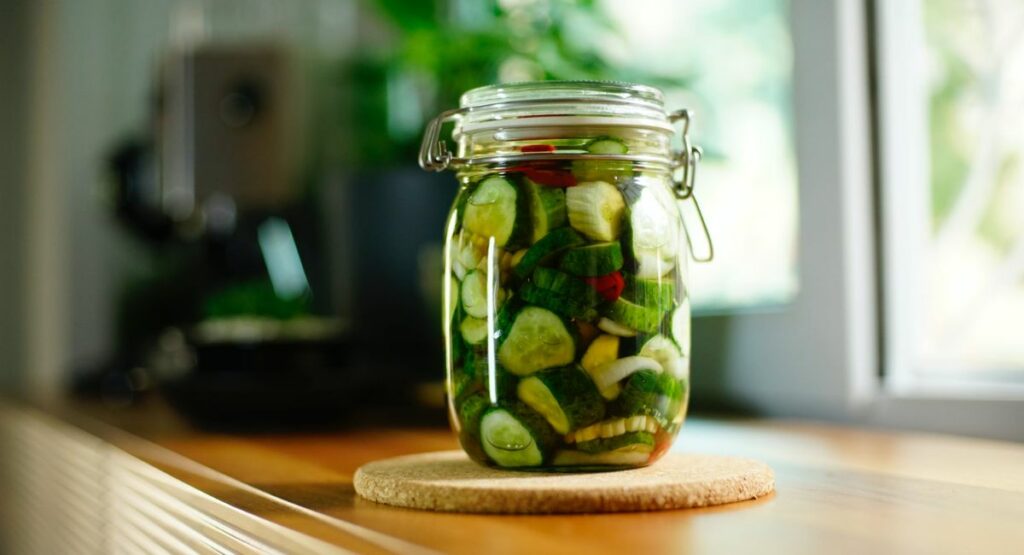
Pickles are a popular condiment throughout the world and come in many different types. The most common type of pickle is the cucumber pickle, which has been enjoyed for centuries. However, there are other kinds of pickles available that use different vegetables or fruits as their base ingredient. Here are some of the different types of pickles:
- Dill Pickles: Dill pickles are one of the most popular types of pickles. They are made using a vinegar-based brine infused with dill weed, which gives them a strong herbaceous flavor. Dill pickles can be enjoyed both sour and sweet.
- Kosher Pickles: Kosher pickles are made following Jewish dietary laws, which prohibit the use of certain ingredients and require specific processing methods. They are typically garlicky, tangy, and seasoned with dill and garlic. Kosher pickles can be made using both the fermentation method and the vinegar-based brine method.
- Bread and Butter Pickles: Bread and butter pickles are sweet and tangy in flavor. They are made using a vinegar and sugar-based brine, often with the addition of onions and spices. These pickles are known for their crunchy texture and are a popular choice for sandwiches and burgers.
- Gherkin Pickles: Gherkins, also known as baby pickles, are small cucumbers that are mainly used for pickling. They are jarred whole due to their small size. In the United States, the term “gherkin” typically refers to a specific type of pickled cucumber, while in Europe, it is used to refer to all types of pickled cucumbers.
- Sweet Pickles: Sweet pickles are made using sugar and sometimes other spices like cinnamon and cloves. They have a distinctly sweet taste and are often used to add a touch of sweetness to salads, sandwiches, and relish trays.
- Sour Pickles: Sour pickles, also known as fermented pickles, are made without vinegar. Instead, they are fermented in a brine of water and pickling salt. If consumed before six weeks of fermentation, they are called “half-sour,” while those fermented for longer are considered fully sour. Sour pickles have a tangy and slightly fizzy flavor.
- Kool-Aid Pickles: Kool-Aid pickles are a unique type of pickle where cucumbers are soaked in a mixture of Kool-Aid powder, sugar, and water. This results in brightly colored and sweet-sour pickles with a fruity twist. Kool-Aid pickles are particularly popular in certain regions of the United States.
These are just a few examples of the different types of pickles available. Each type has its own distinct taste, texture, and preparation method, making pickles a versatile and delicious addition to various dishes and snacks.
How Are Pickles Made
The process of making pickles involves preserving cucumbers or other vegetables in a brine or vinegar solution. Here is a general overview of how pickles are made:
- Cucumbers: The primary ingredient in pickles is cucumbers. Specifically, Kirby cucumbers are often used due to their short and firm nature with a bumpy skin. However, you can pickle other vegetables as well, depending on your preference.
- Brine or Vinegar Solution: There are two main methods of pickling: lacto-fermentation and vinegar-based. Lacto-fermentation involves using naturally occurring lactic acid bacteria to create a sour, tangy flavor. In this method, cucumbers are soaked in a brine of water and pickling salt, allowing the bacteria to ferment the cucumbers. Vinegar-based pickles are made by adding acetic acid, typically in the form of vinegar, to the cucumbers. The vinegar serves as a preservative and imparts a tangy flavor to the pickles.
- Flavoring: Various flavorings can be added to enhance the taste of pickles. For dill pickles, dill weed is commonly used. Garlic, onions, mustard seeds, and other spices can also be added to the brine or vinegar solution to create different flavor profiles.
- Fermentation or Processing: In lacto-fermentation, the cucumbers are typically placed in jars or containers and left at room temperature for a period of time, allowing the natural fermentation process to take place. The duration of fermentation can vary depending on the desired flavor and texture. In vinegar-based pickling, the cucumbers are submerged in the vinegar solution and may be heated or processed in a hot water bath to prolong shelf life.
- Preservation: After fermentation or processing, the pickles are sealed in jars or containers to preserve them. This can be done using canning techniques such as heat processing or refrigeration for refrigerator pickles. Proper sealing and storage help maintain the pickles’ quality and extend their shelf life.
It’s important to note that the specific methods and recipes for making pickles can vary. Homemade pickles allow for experimentation with flavors and ingredients, while commercial production often involves specialized machinery and technology to mass-produce pickles efficiently.
Ingredients Used in Making Pickles
The ingredients used in making pickles can vary depending on the type of pickle and personal preferences. However, here are some commonly used ingredients:
- Cucumbers: Fresh, firm, unwaxed cucumbers are typically used as the base ingredient for making pickles. The size of the cucumbers can vary depending on the type of pickle. Gherkins, for example, are made using small cucumbers about 1½ inches in length, while dill pickles often use cucumbers that are around 4 inches long.
- Brine or Vinegar Solution: Brine or vinegar serves as the main liquid component in pickling. The brine is typically made by combining vinegar, sugar, salt, and water. The ratio of these ingredients can vary depending on the desired taste and the specific recipe. Different types of vinegar can be used, such as white vinegar or apple cider vinegar.
- Sugar: Sugar is often added to the brine to balance the flavors and provide a touch of sweetness. The amount of sugar can vary depending on the desired level of sweetness and the type of pickle being made.
- Salt: Salt is an essential ingredient in pickling. It helps draw out moisture from the cucumbers and contributes to the overall flavor and preservation of the pickles. Pickling salt or kosher salt is commonly used due to its pure flavor and lack of additives.
- Spices and Herbs: Various spices and herbs can be added to the brine or packed with the cucumbers to infuse flavor into the pickles. Commonly used spices and herbs include whole black peppercorns, red pepper flakes, dill seed, mustard seed, garlic cloves, fresh dill, thyme, and bay leaf. These additions can enhance the taste and provide aromatic notes to the pickles.
It’s important to note that these are general ingredients used in pickle making, and the specific combinations and quantities can vary depending on the recipe and personal preferences. The beauty of making pickles at home is the flexibility to experiment with different ingredients and flavors to create unique and customized pickle varieties.
How to Eat Pickles
From their crunchy texture to their tangy flavor, pickles have won the hearts and taste buds of many. But have you ever thought about enjoying pickles in different ways? Below, we will explore some creative and delicious ways to enjoy pickles beyond the jar. From appetizers to main dishes, pickles have the power to transform any ordinary dish into an extraordinary one. So, grab a jar of pickles and let’s get started!
- Eat pickles straight from the jar: One of the simplest ways to enjoy pickles is by eating them straight from the jar. This is a classic and no-fuss way to indulge in your favorite snack. You can simply grab a pickle and enjoy it as a cold and crunchy snack. If you don’t like using your fingers, you can use a fork to pull the pickle out of the jar. It’s that easy!
- Make roll-ups: Looking for a fun and creative appetizer idea? Try making ham and pickle roll-ups. Soften cream cheese in the microwave, spread it on a pickle, and roll it up with a slice of ham. This combination offers a sweet and salty taste that is sure to impress your guests. It’s a perfect appetizer for any party or gathering!
- Fry pickle slices: Want to indulge in a crunchy and delicious snack? Try frying pickle slices. Slice pickles into rounds, coat them in batter or breadcrumbs, and fry them until they become crispy. This can be a tasty and indulgent way to enjoy pickles. You can serve them with a dipping sauce of your choice, and you’ve got yourself a perfect snack.
- Use pickles as an ingredient: Pickles can add a tangy and flavorful kick to various dishes. You can chop pickles and add them to salads, sandwiches, burgers, or even on top of pizza for an extra burst of flavor. Pickles can also be used as a substitute for other acid components such as vinegar or lemon juice in recipes, providing a unique taste to your culinary masterpieces.
- Explore unique pickle recipes: You can take your love of pickles to the next level by trying out some unique pickle recipes. For example, dill pickle bread, where the dough is made with pickle juice, dried dill, and chopped dill pickles, creating a unique and flavorful bread. Another example is pickle soup, which is a popular dish in Poland, made with potatoes, carrots, celery, and of course, pickles! This soup has a distinct and delicious flavor that must be tasted to be believed.
- Pickled vegetables: Pickles are not limited to cucumbers. You can also enjoy pickled vegetables by using the pickling process to preserve and flavor vegetables of your choice. Carrots, beets, radishes, and even cauliflower can be turned into tasty and crunchy pickled vegetables. These pickled vegetables can be used as a healthy snack or an excellent addition to your favorite meals.
When eating pickles, it’s worth noting that they can provide health benefits. Pickles, particularly fermented ones, offer more health benefits and are rich in vitamins such as vitamin K and vitamin A. Even unfermented pickles still contain some vitamins and can contribute to your daily nutrient intake.
Remember to enjoy pickles in moderation as they can be high in sodium due to the pickling process. Additionally, it’s essential to choose pickles made with high-quality ingredients and avoid pickles that contain non-halal or non-compliant ingredients if following specific dietary guidelines.
Feel free to explore different ways to eat pickles and experiment with incorporating them into your favorite recipes to enhance flavor and add a delightful tanginess to your dishes.
You might also like these related articles
Is Sauerkraut Halal: Delve into the world of sauerkraut to uncover whether this fermented cabbage dish complies with halal dietary guidelines. Explore the ingredients and production process in this informative read.
Is Relish Halal: Join us on a journey to explore the halal compliance of relish. Learn about the ingredients that go into this condiment and whether it meets the requirements of a halal diet.
Is Kimchi Halal: Spice up your knowledge about kimchi and its halal status in this article. Explore the fermentation process, ingredients, and cultural significance of this Korean dish to determine its place in your halal menu.
Frequently Asked Questions
1. Are Fermented Pickles Haram?
The halal status of fermented pickles may vary depending on individual interpretations and opinions. While some sources consider fermented pickles to be acceptable for halal consumption due to the minimal presence of ethanol, it is recommended to consult with a knowledgeable Islamic scholar or halal certification organization for specific guidance. They can provide more precise information based on ingredients, production methods, and cultural norms.
2. Is Yeast Halal In Islam?
Yes, yeast is generally considered halal in Islam. Most sources indicate that yeast, including bakers yeast and dry yeast, is permissible for consumption. However, it is important to verify specific ingredients and processing methods to ensure compliance with Islamic dietary laws. If there are doubts or concerns, consulting with a knowledgeable Islamic scholar or halal certification organization is recommended.
3. Are pickles healthy for you?
Pickles can be a healthy addition to your diet. They are a rich source of vitamins and minerals, including vitamin A and vitamin K. Pickles also provide fiber and can contribute to a well-rounded intake of vegetables and fruits. However, it’s important to note that pickles can be high in sodium, so individuals who need to limit their sodium intake should consume them in moderation. Some studies suggest potential health benefits of pickles, such as weight loss support, diabetes management, and cancer prevention, but further research is needed. However, as with any food, it’s best to incorporate pickles as part of a balanced and varied diet.
4. Are pickles good for your gut?
Pickles can be beneficial for your gut health. They are often made through the process of fermentation, which involves the growth of beneficial bacteria that can support a healthy gut microbiome. The fermentation process results in the formation of probiotics, which are live microorganisms that can provide health benefits when consumed. These probiotics found in pickles can help maintain a balanced gut flora, aid in digestion, and support overall gut health. Additionally, pickles contain vinegar, which has been linked to reduced appetite and slower absorption of carbohydrates by the digestive system.
5. Can I eat a pickle before bed?
Eating a pickle before bed may have varying effects on sleep and overall well-being. Some sources suggest that consuming pickles, especially those that have been fermented or pickled, close to bedtime may cause poor sleep or bad dreams. However, it’s important to note that these claims are not widely supported by scientific evidence. On the other hand, pickle juice, which is the liquid from pickles, has been touted for potential health benefits when consumed before bed. It is claimed to contain acetic acid, which may help reduce insomnia. However, it’s worth noting that more research is needed to confirm these claims and understand the specific effects of pickle juice on sleep.
6. Is a pickle a vegetable?
While pickles are derived from cucumbers, which are technically classified as fruits, the pickling process and the resulting product are generally considered as vegetables. Additionally, pickles are known for their low calorie and sodium content, which aligns with the nutritional characteristics of vegetables.
7. Are pickles vegetarian?
Pickles, being primarily made from fruits or vegetables, are typically considered vegetarian. However, it’s always recommended to verify the ingredients and production methods to ensure they meet individual dietary needs. Some pickles may contain ingredients like sugar or coatings that are not vegan-friendly.
